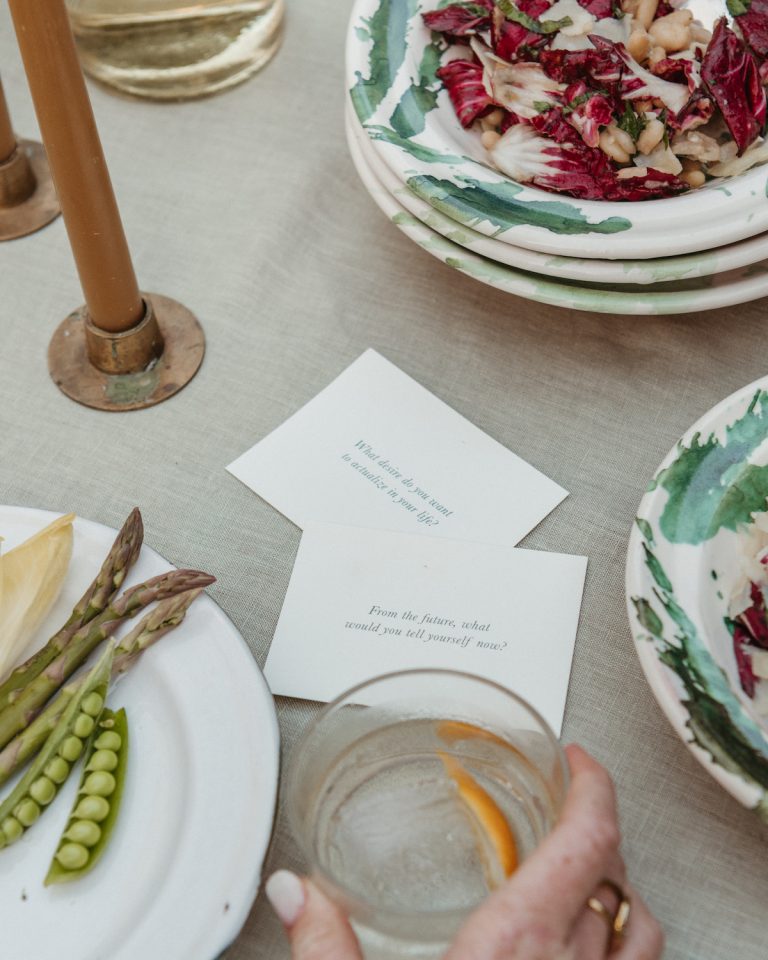It’s no secret: we love to gather. Any excuse for a party, we’ll be there to celebrate. With friends, family, and even strangers (who won’t be strangers for long), we’re always up for good food and good conversation. But the latter? In a post-pandemic world, where we’re *still* getting used to in-person parties and taking the meet-and-greets off Zoom, that’s not always easy to make happen. Thankfully, the internet is full of small talk tips that go way beyond chatting about the weather.
The social nicety of get-to-know-you chats is back in a big way. And though small talk has always been a skill to be mastered, it may feel even more daunting in our digital-first society. In a season of so many intimate gatherings, work events, and coffee meet-ups, we’ll take all the small talk tips we can get. And if you’re feeling a little intimidated? Don’t worry—you’re not alone.
Featured image from our interview with Devon Liedtke by Anastasiya Pudova.
7 Small Talk Tips for Easy, Genuine Conversation
After hearing so many clients express anxiety about the return of office banter, John Bowe, a speech trainer and author of I Have Something to Say: Mastering the Art of Public Speaking in an Age of Disconnection, was inspired to share a few tips with CNBC to help to get the conversation effortlessly flowing once again. However, the award-winning journalist is more interested in meaningful connection than perfect speaking skills. So in place of how-to small talk tips to tackle, Bowe provides conversational pitfalls to avoid.
The funny thing about office small talk, of course, is how universal its challenges feel. Ahead, discover a few of our favorite Bowe small talk tips that are particularly relatable for everyday gatherings.
Consider Your Entry
Of all the small talk tips, this might be our favorite. (And honestly, the one we need the most.) When mingling at a party or even just a communal area, knowing how to drop seamlessly into an already ongoing conversation can be intimidating, but timing is everything.
“First, wait for a lull. Then once you have someone’s attention and, ideally, receive a non-verbal go-ahead, that’s your chance,” Bowe writes for CNBC. “Keep distance in mind, too; don’t stand too close or too far away. You do want to be heard. You don’t want to shout or come across as creepy.”
Don’t Dive in With Controversial Topics
Being able to have challenging conversations is important, but when it comes to a light discussion with someone you’re still getting acquainted with, consider sticking to something you know you both share.
“If you gravitate towards [controversial] topics later on, great. But for starters, aim for something simple and close at hand that you and the other person can observe together,” Bowe writes.
Don’t Make It About Yourself, But Don’t Make It All About Them
There’s nothing worse than leaving a conversation feeling worried that you’ve left the wrong impression. Did I ask them enough questions? Did I just make that whole exchange about me? Naturally, if you’re nervous about commandeering the chat, you may end up putting too much pressure on the other person. A small talk tip mantra to keep in mind: the best conversations are balanced ones.
“Nobody likes to feel interrogated, so if you sense that questions aren’t welcome, back off. Instead, tell a story, offer an opinion or otherwise relieve them of the burden of performance,” Bowe explains.
Don’t Write Off Small Talk Altogether
It’s easy to dismiss the informal discourse as too trivial or insincere. Having a disdain for small talk can practically become a personality trait. But polite conversations about seemingly unimportant things can lead to something so much greater.
“Every relationship you value began somewhere—with an initial conversation,” Bowe notes. “Was it profound? Did you cure cancer? No. But you made a genuine connection.”
Read the full story, complete with all of Bowe’s insight, on CNBC.com.
This post was originally published on August 30, 2021, and has since been updated.




























































